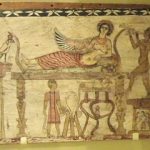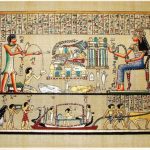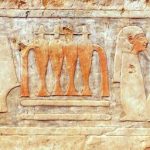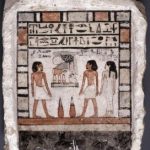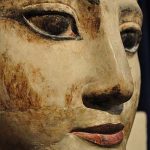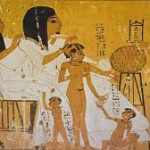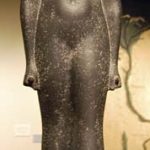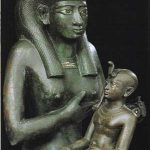In the medical field, women are mentioned as nurses and depicted as midwives. Males and females were nurses who assisted the doctors in procedures. Nurses also played an important role in the life of the king. Egyptologist Carolyn Graves-Brown writes:
In the New Kingdom, at least, the royal nurse was an important person, being so close to the king. Despite the fact that women’s occupations are rarely shown in the tombs of their male relatives, tomb owners often show their female relatives in the role of nurses to the king. Hatshepsut’s nurse, Sitre, was important enough to be buried near her queen. Nurses also seem to have been held in high regard by the non-royal elite, as they are shown in private tomb chapels and on stelae with the family.
Queen Hatshepsut (1479-1458 BCE) founded medical schools and encouraged women to pursue medicine. Other New Kingdom queens are also thought to have encouraged the same, notably Queen Tiye (1398-1338 BCE) and Nefertiti (c. 1370- c. 1336 BCE), both of whom are noted for their social programs. As far as any official record is concerned, however, there is no evidence for this. Aside from the position of nurse, women in medicine are recorded as midwives and wet nurses.

The wet nurse was an especially important role considering the high mortality rate of women in childbirth. Legal documents establish agreements between women and expectant parents to care for the newborn should the mother die. Graves-Brown notes how these agreements “stipulate that a wet nurse was to have a trial run before being hired; she was obliged to provide milk of a suitable quality, not to nurse any other children, and not to fall pregnant or enter into sexual activity” (83). In return, the employer would pay the nurse and also provide oil for use in massaging the newborn child.
The Ptolemaic Period & Later
Legend links Queen Cleopatra VII (69-30 BCE) with the medical profession as the author of a book on the subject; most likely, however, she simply continued the policies of earlier queens such as Hatshepsut and sponsored such works. Her name has been linked to the famous Roman physician Galen (126 – c. 216 CE), who lived long after her, and this is because of another, lesser-known, Cleopatra.
This other Cleopatra is regularly referenced as living c. 2nd century CE, but it seems clear she lived earlier, probably during the Ptolemaic Period, and was cited in works from the later time. This Cleopatra was known for authoring a book on obstetrics which was regularly consulted by doctors, including Galen. It is probable that later writers confused the physician Cleopatra with the monarch but also possible they knew of the queen’s involvement in medical matters better than later historians who wrote on her. Scholar Okasha El Daly comments on this, writing:
It may have been the fame of Queen Cleopatra, either as an author of medical books or due to her patronage of such works which Galen consulted, that gave rise to this claim in Arab sources of a connection between him and Cleopatra as his teacher.
Women in Egypt continued to exercise authority in medicine and the sciences until the triumph of Christianity in the country in the 4th century CE. The clearest evidence of this is seen in the life of Hypatia of Alexandria (c. 370-415 CE), the philosopher who instructed her largely male students in philosophy and science until she was murdered by a Christian mob.
The claim that there were no women, or only a few, involved in medicine in ancient Egypt is untenable and does not accord with the values of the civilization. By this reasoning, there were no women involved in anything of note anywhere in the world until the modern era because history books make no mention of their contributions. This point is made clear in Virginia Woolf’s brilliant essay Shakespeare’s Sister from A Room of One’s Own in which she imagines the life of the playwright’s equally gifted sister in a society which did not value women. Although Elizabethan England was ruled by a queen, opportunities for women of the time were few; unlike in ancient Egypt. Female physicians’ names may be largely missing from Egypt’s historical record, but this same can be said for most of recorded history. Unlike the histories of other cultures, however, it is clear that women in Egypt could hold positions of importance and respect and further that a number of them did.


